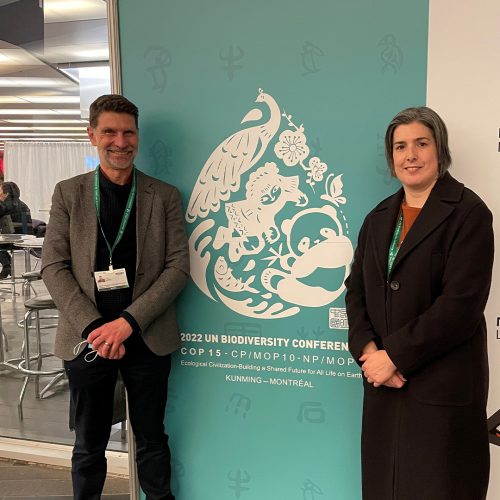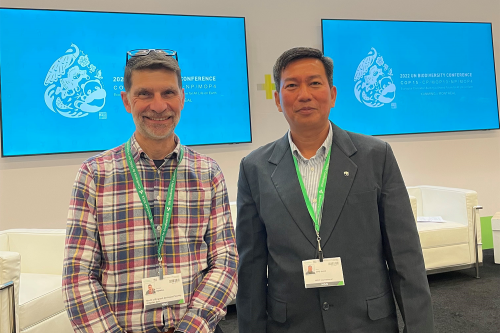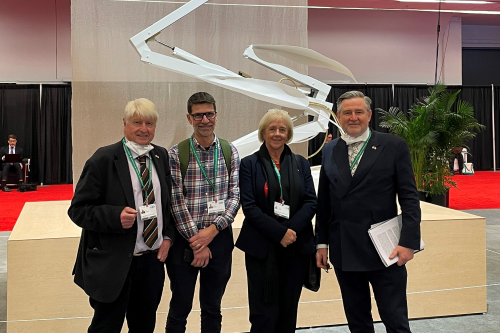With just hours before the final deadline, an agreement was reached for global biodiversity at the fifteenth Conference of the Parties (COP15), on the Convention on Biological Diversity (CBD) in Montreal, Canada.
Central to the final agreement is the Post-2020 Global Biodiversity Framework (GBF) which provides the roadmap for governments, business and civil society to rescue nature in the crucial period up to 2030.
At the beginning of the conference, United Nations Secretary General Antonio Guterres called for ‘a peace pact with nature’ after decades of willful destruction. The means of achieving this is complex with virtually every aspect of our lives impacting on biodiversity and ecosystem health. The Framework addresses this with its vision for a world living in harmony with nature by 2050 and its four goals covering,
- integrity of ecosystems
- nature’s contribution to people
- equitable sharing of the benefits of biodiversity
- closing the financial gap.
Sitting beneath these are the 21 targets which are designed to focus public and private sector policy in all the countries that sign up to the Convention. Some of the goals and targets of the Framework align with our own targets, including:
Protect 30% of land and sea for nature by 2030
Known as the 30×30 target, this is perhaps one of the most tangible outcomes. At the beginning of the meeting, some were talking about it as the ‘Paris moment’, equivalent to the 1.5 degree limit on global average temperature rise which was set at the climate COP in Paris in 2015 and which has driven the science based target approach to reducing greenhouse gas emissions ever since.
Restore 30% of degraded ecosystems by 2030
Our habitat creation and restoration as part of our Nature Recovery Corridor in Cheshire will make a contribution to the UK element of this target.
Halt biodiversity loss and end species extinction by 2030
Delivery will depend on the species conservation actions of organisations like ourselves who are actively involved in conservation breeding, reintroductions, managing populations in the wild and lobbying for protection of a wide range of species of plants and animals.
This is a key part of our Conservation Masterplan which includes a commitment to reversing the decline of at least 200 populations by 2030 and these will make a direct contribution to the global target.
Cut food waste across the globe by half and reduce overconsumption
This can only be achieved through empowering people to make responsible consumer choices and act for wildlife in their everyday lives which is what we are already delivering through our education and public engagement campaigns and which forms our Conservation Masterplan target to empower 10 million people to live sustainably for wildlife.
Chester Zoo attend COP15
Simon Dowell, our Conservation Science and Policy Director, and Charlotte Smith, our Director of Conservation Education, attended the first week of COP15 and observed at first hand the detailed and painstaking process that went in to reaching agreement.
Government negotiators, advised by the representatives of environmental organisations, business and indigenous communities attend a series of long meetings which review each document line by line, aiming to reach consensus on every paragraph of the whole agreement. ‘Side events’ are held between these meetings at which experts present compelling evidence of the urgency of the global threat to nature and what action is required.

“We were able to engage in a number of the side events and it’s clear that they help to influence the negotiators who attend them by emphasising the importance of gaining an effective agreement. Although not perfect, we are delighted that an agreement has been reached and in awe of the government negotiators who have worked tirelessly on reaching consensus.”
Simon Dowell, Conservation Science and Policy Director

One striking aspect of this conference has been the engagement with indigenous people, many of whom have previously been marginalised and ignored. It is no coincidence that the least degraded landscapes for nature are those still occupied by indigenous people who have lived in harmony with nature for thousands of years.
Another important set of voices during the discussions, was that of young people. Charlotte Smith said: “This is after all their future being debated. The Global Youth Biodiversity Network (GYBN) which represents young people (under 35) from across the globe, met for a two day Youth Summit just prior to the main meeting. Then around 100 GYBN representatives attended the main COP, taking part in panels, leading events and making representations to the various meetings. During our time there we met with representatives from GBYN to discuss how we, and particularly our own Youth Board, might connect with them.”
And a third crucial group are the global business community. While in Montreal, Simon attended the latest session of the ‘World Biodiversity Summit’ a meeting convened by the World Climate Foundation to bring the business and finance sectors together to discuss how they can support nature.

Now we have an historic global agreement on biodiversity, what happens next?
On the last Friday of COP15 the UK government belatedly announced its environmental targets, which were both a response to the conditions set under its own Environment Act, and an indication of how it is going to deliver the UK contribution to the GBF. Having provided a detailed response to an earlier consultation on these, we at Chester Zoo were eager to see the final targets. Unfortunately we were to be disappointed. Despite an overwhelming call from over 90% of respondents to the consultation for the government to show more ambition, the final targets barely changed and some are actually weaker than the original. In some cases it is difficult to see how they will enable the government to meet its obligations under the GBF newly agreed in Montreal. In particular, targets on species recovery and on improving water quality, both issues we have campaigned on, are weak and unambitious. We are joining other environmental organisations in the UK to ask the government to strengthen its resolve.
We cannot leave it up to governments to act, given the scale of the challenge this will have to be implemented by all of us if the vision of the CBD is to be achieved. With their wide constituencies of visitors, members and supporters, zoos have a major role to play in this.
In January we will co-host and participate in a global webinar to address how our behaviour change campaigns can help to deliver the GBF and begin to transform our societies to be less wasteful and more sustainable. Look out for more info on this event soon.
OUR TEAM OF EXPERTS WORK IN SIX REGIONS AROUND THE GLOBE – REPRESENTING SOME OF THE PLANET’S MOST BIODIVERSE HABITATS. Discover more about our SCIENCE AND CONSERVATION work.